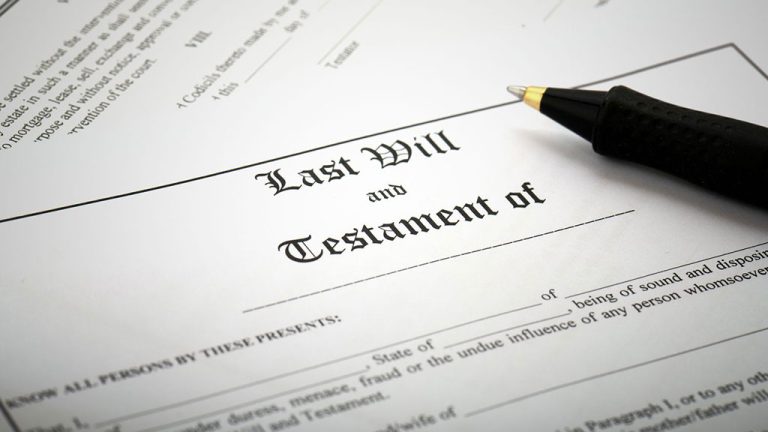Legal Resources
Explore Our Legal Insights
Legal Wisdom Unveiled
Stay informed with our blog, where our legal experts share valuable insights on Lady Bird Deeds, Estate Planning, and more.

Commercial Property and Ladybird Deeds: Understanding the Risks of Uncapping Taxable Value
A Ladybird deed is often an ideal estate planning tool for residential property owners who wish to avoid probate while retaining control over their property

What states allow Lady Bird Deeds?
Lady Bird deeds, also known as Enhanced Life Estate Deeds, are recognized in a limited number of states.

Crafting Your Legacy: Key Elements of a Solid Last Will and Testament
When it comes to estate planning, one of the fundamental documents you need is a Last Will and Testament. Your will is not just a

Navigating Probate: A Comprehensive Guide to Understanding and Avoiding the Process
The term “probate” often surfaces in discussions about estate planning, sparking curiosity and, at times, a sense of uncertainty. In this blog post, we’ll demystify
Frequently Asked Questions
Your Questions, Our Answers
Explore our comprehensive Q&A section to find answers to the most commonly asked questions about Lady Bird Deeds and Estate Planning
Top 10 Questions About Lady Bird Deeds
What is a Lady Bird Deed, and How Does It Work?
A Lady Bird Deed is a type of enhanced life estate deed that allows property owners to transfer property to heirs while retaining control during their lifetime.
What Are the Benefits of Using a Lady Bird Deed?
Benefits include avoiding probate, retaining control, Medicaid planning, flexible estate planning, and more.
Are Lady Bird Deeds Only Valid in Michigan?
While popular in Michigan, Lady Bird Deeds can be used in various states with varying legal requirements.
Can I Change or Revoke a Lady Bird Deed?
Yes, Lady Bird Deeds are revocable during the property owner’s lifetime, allowing for changes as needed.
What's the Difference Between Lady Bird Deeds and Regular Warranty Deeds?
Lady Bird Deeds provide specific benefits, including avoiding probate, which regular warranty deeds may not offer.
How Does a Lady Bird Deed Affect Medicaid Eligibility?
A properly structured Lady Bird Deed can help protect assets while maintaining Medicaid eligibility.
Can a Lady Bird Deed Be Challenged in Court?
While not immune to legal challenges, Lady Bird Deeds are generally upheld if properly executed.
Is a Lady Bird Deed Suitable for Every Property Owner?
Lady Bird Deeds can be beneficial for many, but the suitability depends on individual circumstances and goals.
What Are the Tax Implications of Using a Lady Bird Deed?
Lady Bird Deeds typically do not trigger immediate tax consequences; however, it’s crucial to consult a tax professional.
How Do I Create a Lady Bird Deed?
Consulting with an experienced attorney is essential to ensure the proper creation and execution of a Lady Bird Deed.
Top 10 Questions About Estate Planning
What is Estate Planning in Rochester Hills, Michigan?
Estate planning is the practice of managing the assets that you’ve accumulated over your lifetime in the event of your incapacity or death. It often requires the input of an estate planning attorney in Rochester Hills to secure your assets and wishes according to your directives.
Examples of assets subject to estate planning can include:
- Real (immovable) property
- Personal (movable) property
- Investments
- Retirement benefits
- Business interests and holdings
- Insurance
At its core, estate planning ensures that your assets pass on to your loved ones in accordance with your wishes. It also gives you more control over what happens to your assets if you become incapacitated.
Estate planning can take several forms, with the two most common being will-based planning and trust-based planning.
Will-Based Estate Planning
Will-based planning involves you drawing up a legal document that outlines how to distribute your assets, who will care for any minors, and who will handle your final affairs. The main drawback of will-based estate planning is that your assets will have to go through a Michigan Probate Court, which is a time-consuming and costly process.
Trust-Based Estate Planning
Trust-based planning involves establishing a living trust that outlines who will handle your financial affairs or distribute your assets after your death. Trusts offer several advantages over wills in that they avoid the Probate Court and help minimize or eliminate federal estate taxes. While more complex and expensive to set up, having a living trust is rapidly becoming the go-to estate planning method due to its many advantages.
Every person’s situation is different, which is why we recommend speaking to an estate planning lawyer about what solution works best for your current needs.
How Do I Prepare for an Estate Planning Meeting in Rochester Hills?
Estate planning can be very emotionally fraught. Your first step should always be to find the right real estate law firm in Rochester Hills, MI, that is compassionate, knowledgeable, and determined to help you achieve your goals.
The first meeting with your estate planning attorney in Rochester Hills will involve the attorney becoming familiar with your situation. The more information you bring to this meeting, the easier it will be for the lawyer to develop the right plan for you and your loved ones.
Your estate planning lawyer will send you a list of documents to bring along for the initial estate planning meeting. These will include:
- At least the last three months of your financial statements, including checking and savings accounts, money market accounts, brokerages, pensions, and IRA statements
- The deeds to any properties you own
- Any previous estate planning documents, including wills and trusts
- Any prenuptial or postnuptial agreements
- Business agreements
- A copy of your retirement plan
- A copy of your life insurance policy
- Any divorce agreements
- Contact information for your family members
- Contact information for your doctors
Take the time before your initial meeting to draw up a list of potential candidates for trustees, health care agents, or executors of your will. You’re putting a lot of trust into these individuals, so make sure you carefully consider all your options.
It’s also a good idea to go into the meeting with a sense of your estate planning goals. The needs of a young individual are very different from those of a married couple with grandchildren, and your estate plan must reflect that.
The most common estate planning goals include:
- Providing for loved ones after your death
- Minimizing taxes
- Avoiding probate administration
- Ensuring the proper administration and stewardship of your assets
- Planning for incapacity
Your estate planning lawyer will often start by identifying your goals and developing an estate plan to achieve them. By coming into the meeting prepared, you can decide your most important objective and hone in on it from the very start of your journey.
You will eventually develop a long-lasting relationship with your estate planning lawyer. Making the right choice from the outset will ensure the best results for you and your loved ones.
A good way to decide whether a firm is the best option for your situation is during the first estate planning meeting. Use this meeting as a test to evaluate your potential working relationship with the estate planning lawyer. Don’t be afraid to ask questions and raise any concerns during this session.
Be honest with your attorney about what you want and your current situation. The better the lawyer’s understanding of your needs, goals, and current outlook, the more reliable and useful their estate planning advice will be. Remember, estate planning is an evolving process where you will constantly make adjustments to achieve your ideal estate planning goals, and the initial meeting is just the first step of a decades-long relationship.
What Questions Should I Ask a Rochester Hills Estate Planning Attorney?
There are two reasons you should ask plenty of questions during your meeting with your estate planning lawyers. The first is to understand better real estate law and how it directly affects you and your loved ones. The second is to evaluate whether the law firm is the right fit for you.
A good estate plan will protect and provide for your family after your death, keep your assets out of probate court and ensure that your wishes are met. You should work with a law firm that has the knowledge and experience to help you achieve those goals. Estate planning mistakes are expensive and will only often come to light during the stressful months after your passing.
By asking the right questions, you can avoid these mistakes and get peace of mind that you’re working with the right lawyers in Rochester Hills, MI. Here are some of the most important questions to raise to determine whether you’ve chosen the right estate planning attorney in Rochester Hills.
Does Your Office Handle the Signing Ceremony?
Formalizing your will, trust, or estate plan isn’t as simple as just sitting down and signing some documents. Many rules, regulations, and formalities guide the signing process, and any mistakes can render the entire plan void.
Good estate planning law firms will handle this aspect of the plan in addition to everything that comes before. They will ensure you sign everything correctly and provide the correct witnessing and notarization to implement your plan formally.
Do You Offer Flat-Fee Pricing?
Most lawyers in Rochester work on per-hour billing, which can lead to unpredictable billing cycles and potential overinflation of the actual costs of drawing up an estate plan.
In general, after the initial consultation, the lawyer should have a good idea of how long it will take to draw up the will, trust, or estate plan. Flat-free pricing suggests that the firm knows what they’re doing and is confident enough to bill you in advance for their services.
What Should Be Included in Estate Planning?
Each estate plan will be different, but the general considerations remain the same. The plan should consider both your death and disability and address the distribution of your assets while minimizing tax liability and avoiding probate administration as much as possible.
Your estate planning attorney in Rochester Hills will go over every one of these aspects with you, letting you choose which ones are most applicable to you.
Comprehensive Insurance
Insurance can address any debts and provide for loved ones in the event of your death or disability. It’s especially important if you have minors or dependents who rely on you for financial support. Life insurance is the most important consideration, as it can protect your family from your debts while also providing a modicum of stability in the time directly after your death.
Updated List of Beneficiary Names
It may seem small, but getting your beneficiary names or contact details wrong can be a substantial mistake. This issue is especially true in contentious families, where an unclear beneficiary can result in months in court and thousands of dollars in unnecessary legal fees.
Provisions for Minors or Disabled Children
A large part of estate planning is deciding how to best care for your successors. This information ranges from assigning guardians to minors and disabled children to establishing a living trust. Living trusts are an excellent long-term solution that helps children manage their finances and ensures that disabled heirs receive the care they need for the future.
Disposal of Remains
It may sound macabre, but funerals are one of the most stressful parts of saying goodbye to a loved one. Having a prepared funeral plan can take away much of that stress by having a prepaid funeral. You can also include provisions for burial or cremation, as well as any instructions on organ or body donation.
Compilation of Digital Profiles
You probably have a host of digital profiles, including your bank accounts, email, and investment portfolios, that are essential to disbursing your assets in the event of your death. To minimize the hassle of accessing these accounts, make sure to keep an up-to-date list of logins and passwords to these accounts in a safe location and nominate someone to have access to these assets in the event of your death.
Paperwork Storage
Having a storage plan can significantly expedite the execution of your will. Make sure to store all documentation safely and your appointed representative has access to these documents in the event of your death or disability.
In addition to the will, trust, or estate planning documentation, keep any insurance policy documentation, investment documentation, recent bank statements, and credit card statements in the same place.
Doing so will ensure that your representative has quick access to your money and assets when necessary to execute your will in accordance with your wishes.
What Are the Four Important Estate Planning Factors?
No matter what your wishes are after your death, there are four main factors that a good estate plan will include. These ensure that your assets go to your loved ones and also make provisions for disability and incapacity.
1. Last Will and Testament
If you die without a will, the state will disburse your assets in accordance with the law, which may not align with your wishes. A will doesn’t avoid probate court, but it ensures that it goes through probation according to your instructions that are significantly more pertinent to your situation.
2. Living Trust
Trusts are an excellent method to avoid probate administration and can also protect your assets from tax liability. With a trust, your assets pass directly onto the successor trustee, who will disburse the assets to the trust beneficiaries following your instructions.
3. Financial Power of Attorney
Granting someone financial power of attorney means that they can make financial decisions in the event that you can’t make them yourself, either through disability or incapacity.
4. Medical Power of Attorney
A medical power of attorney empowers someone you trust to make medical decisions on your behalf. You can explicitly outline your wishes for end-of-life care in your will, which will empower the representative to act per your plan.
What documents are in a basic estate plan and why?
A basic estate plan should consist of:
- Last Will & Testament
- Durable Financial Power of Attorney
- Patient Advocate Designation
Last Will & Testament
A Last Will & Testament is the written wishes of a person’s intent with regard to selection of fiduciaries and instructions to the probate court of the writer’s selection of people who are going to follow up and assist with the probate process (fiduciaries), who will watch over minor children(Guardian & Conservator) and who the person wants as beneficiaries. The first paragraph of the Last Will and Testament identifies the individual making the Will, known as the Testator. The next paragraph of the Will indicates that the person’s debt, funeral expenses, and taxes should all be paid from the proceeds of testator’s estate before the beneficiaries are paid. The Last Will and Testament is the only place to identify a Guardian for any minor children of the testator. The guardian is the person who would raise the children should the parents pass prematurely. If both parents pass or become incapacitated they can identify the person/guardian, her minor children in her Last Will & Testament. The Last Will and Testament is also the only place to identify a Conservator for any minor children. The conservator is the person who would manage the children’s money and finances, should the parents pass prematurely. If both parents pass or become incapacitated the Testator can identify the person, she wishes to become conservator. Next, the Last Will & Testament is where individual name a funeral representative. This is a recent fiduciary role named in the will. This person is named as the funeral representative and has the legal authority to sign for and make final decisions regarding the decease remains and burial arrangements. This appointment helps avoid family disputes, particularly in blended family situations.
Durable Financial Power of Attorney
A Durable Financial Power of Attorney helps manage your assets and debt should you be unavailable or incapacitated. In this doc you appoint another to make your personal financial decisions and consent to business arrangements. Effective either immediately or upon your incapacity. This document helps you and your family avoid the living probate process of have to set up a conservatorship through the local county probate court, to get legal authority and permission to access your funds or give consent your behalf.
Patient Advocate Designation
Known as PAD, helps manage your medical, healthcare and end of life decisions, should you become incapacitated. This is a doc where you appoint another to make your personal medical decisions and arrangements. This document is effective upon your incapacity. This tool will help you and your family avoid the living probate process or needing to set up a guardianship through the local county probate court, to get legal authority and permission to access your funds or give consent you’re your behalf.
How do I avoid Probate when I die?
There are several ways to avoid probate including:
- Die with no assets in your name
- You can set up all your assets to pass directly to beneficiaries on accounts, such as bank accounts, retirement accounts and such.
- You can use a revocable living trust.
Who should establish a Living Trust?
- If you own real estate, you should have a living trust.
- If your net worth is greater than $250,000, you should have a living trust.
- If you have children, you should have a living trust; and
- If you have minor children (under the age of 18) you need to have a living trust.
Where do I go to get a living trust?
Your local experienced estate planning attorney. Don’t go to DIY solutions, there is too much at stake. Contacting an Estate Planning lawyer is a simple process. It is well known in the legal profession that for every dollar a client spends on legal assistance now, saves five to ten dollars in the long run.
What other documents do I need, along with my living trust to complete an estate plan?
Although a person may have a trust, it is still necessary to have a Pour Over Will. This and other documents help ensure the secure and ongoing process of our person and their estate, should be become incapacity or upon death.
What if we don’t die? A large portion of American seniors are incapacitated at some point before passing. How does the family avoid “living probate”, such as having to set up a guardianship or conservatorship for a loved one who lost their capacity to make decisions?
To secure our personal dignity and secure our estate, each person should also have these additional documents:
A Durable Financial Power of Attorney. Known as DPA, this document helps manage your assets and debt should you be unavailable or incapacitated. This is a document where you appoint another person to make your personal financial decisions and consent to business arrangements. This person is called your attorney-in-fact.
Effective either immediately or upon your incapacity. This document helps you and your family avoid the living probate process in having to set up a conservatorship through the local county probate court, to get legal authority and permission to access your funds or give consent on your behalf.
A Patient Advocate Designation. Known as PAD, helps manage your medical, healthcare and end of life decisions, should you become incapacitated. This is a doc where you appoint another person to make your personal medical decisions and arrangements.
This document is effective upon your incapacity. This tool will help you and your family avoid the living probate process or needing to set up a guardianship through the local county probate court, to get legal authority and permission to access your funds or give consent you’re your behalf.
Explore More Resources
Unlock More Knowledge
Discover additional legal resources and information related to Lady Bird Deeds and Estate Planning through these helpful links.




